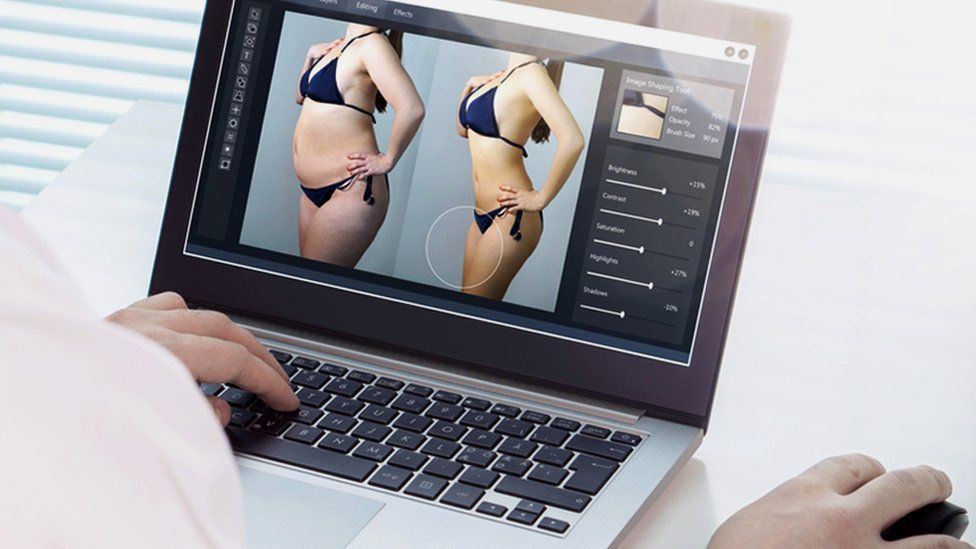Is she Photoshopped? In France, they now have to tell you
- Published

It's no secret that images of models are often retouched to make their bodies look thinner or curvier in certain places, to lengthen their legs to mannequin-esque proportions, or to smooth out their skin and widen their eyes.
From Sunday, in France, any commercial image that has been digitally altered to make a model look thinner will have a cigarette-packet style warning on it.
"Photographie retouchée", it will say, which translates to "edited photograph".
Anyone flouting the new rule could be fined €37,500 (£33,000) or 30% of the cost of creating the ad.
The government is essentially trying to tackle persistent image-doctoring as a public health issue.
It's hoped the change will help tackle extreme thinness among models, and body image problems among those who aspire to shapes they cannot hope to live up to because they were faked on a computer programme.
"Exposing young people to normative and unrealistic images of bodies leads to a sense of self-depreciation and poor self-esteem that can impact health-related behaviour," Health Minister Marisol Touraine said.
Fatness 'despised'
France is not the first country to introduce these kinds of rules. Israel, for example, has already done so.
But thinness gets a lot of attention in France.
Tens of thousands of people in the country suffer from anorexia and the average body mass index (BMI) - a measure used to determine if someone is underweight or overweight - is the lowest in Europe.
In one new book, author Gabrielle Deydier makes the case that thinness is revered in her country, and fatness despised. She even lost her job in a school, she says, after a colleague took exception to her obesity. Another time, in a job interview, she was shocked to hear her interviewer say it was "well-known" that fatter people had lower IQs.
Could a change in the way advertisements are presented make a difference to how French people see their bodies?
It's a concept not entirely rejected by Tom Quinn of UK eating disorders charity Beat.
He told the BBC: "It's simplistic to suggest that looking at Photoshopped images will cause eating disorders. But many people who look at altered images have low self esteem.
"We support any measures that contribute to a society having a healthier view of body types and everyone being more aware of which pictures have been touched up.
"Moving towards a society where there isn't the same pressure on models and the general public to be as thin as possible will be very welcome."
'Ads tell us who we should be'
The veteran lecturer and campaigner Jean Kilbourne, author of Deadly Persuasion: Why Women and Girls Must Fight the Power of Advertising, has said: "Ads sell more than products.
"They sell values, they sell images, they sell concepts of love and sexuality, of success, and perhaps most important, of normalcy.
"To a great extent, they tell us who we are and who we should be."
Anorexia survivor Shannon is campaigning for shops in the UK to use mannequins that reflect a healthy weight because people compare themselves to them
Dr Terri Apter, psychologist and author of The Confident Child, told the BBC that while she felt "this kind of culture" could change, things seemed to be moving very slowly.
"There's not less anorexia than there was 25 years ago, for all the effort that many people have put in," she said.
While the French change "in and of itself" won't "have a big impact on the culture", it will protect models, she adds.
Instagram tricks
This is not the only thing the French government has done recently to try and tackle excessive thinness in the country's world-leading fashion industry. Since May, models have had to show a doctor's note to prove they are healthy, and some top companies have banned super-thin models.
But it's important to remember that there are other tricks of the trade besides Photoshop alteration. Posing a certain way, taking a photo from a certain angle, lighting well or just sucking your tummy in can make a model look very different in a very short time.
This applies both to thinness and the current trend of athletic-looking bodies, flat stomachs, and larger, squat-honed, buttocks.
Allow Instagram content?
This article contains content provided by Instagram. We ask for your permission before anything is loaded, as they may be using cookies and other technologies. You may want to read Meta’s Instagram cookie policy, external and privacy policy, external before accepting. To view this content choose ‘accept and continue’.
It's also worth keeping in mind that the new French rule does not cover retouched hair or instances where the appearance of blemishes has been removed.
Allow Instagram content?
This article contains content provided by Instagram. We ask for your permission before anything is loaded, as they may be using cookies and other technologies. You may want to read Meta’s Instagram cookie policy, external and privacy policy, external before accepting. To view this content choose ‘accept and continue’.
Since the new law was announced, the stock images agency Getty has banned retouched images from its commercial category. It's a sign that a sentiment in favour of showing more attainable bodies may well be spreading.
- Published6 September 2017
- Published19 May 2017
- Published6 May 2017
- Published8 March 2017
- Published30 March 2017
- Published15 October 2013
- Published29 September 2017